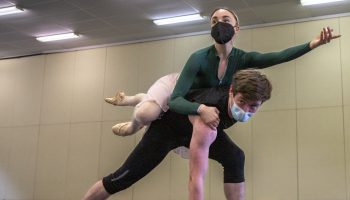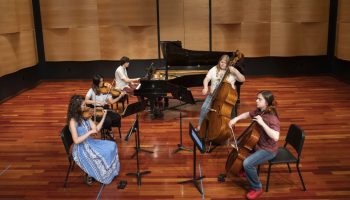
Timothy Jones is breaking the rules in Friday’s piano recital, looking for emphasis in all the “wrong places.”
Right as the first movement of Mozart’s Sonata No. 2 in F major K. 280 begins, there is a low F, the lowest note he will play in the 14-minute selection. Jones decided to give it new meaning.
“I give that F a significant amount of sound so it’s a triumphant beginning,” Jones said. “Although that emphasis may not be academically justified because it falls on the weak beat of a measure, I figured there was no better time than now to try something new.”
For Jones, a student from The University of Texas at Austin, the unprecedented nature of the COVID-19 pandemic has allowed musicians a chance to take “personal liberties,” the freedom of the individual to do as they please.
“The way I recorded it for the recital is definitely not how I would have played it in a competition,” he said. “I do take some personal liberties, but I make sure they are falling in a more tasteful line rather than not.”
Jones, along with four other students from the Chautauqua School of Music Piano Program, will perform in their second recital of the season at 4 p.m. EDT on Friday, July 24, on the CHQ Assembly Virtual Porch.
The three-movement sonata was written in 1774 during the visit Mozart paid to Munich for the production of his opera La finta giardiniera. The first movement was composed in sonata form, a musical structure containing three main sections: an exposition, a development and a recapitulation. The exposition in Jones’ piece consists of three themes, followed by a development, in which the themes are varied and combined, and a recapitulation, in which the exposition is repeated and varied.
It’s very “joyous, a feel-good piece of sorts,” Jones said.
“Any sort of drama or tension that happens in the piece is always followed by something more light-hearted,” he said. “If anything, it’s a way to relax. I am trying my best to put people in a positive mindset, at least for four or five minutes. That’s better than zero.”
Playing Mozart’s music is a paradox in itself, Jones said, for even though it sounds effortless to the listener, the musician is achieving that “childlike simplicity” through constant “effort and decision making.”
“Every single second of playing Mozart is deliberate,” he said. “You feel mentally exhausted afterwards, even though it comes across as a breeze.”
Vincent Ip, a student from Northwestern University, will take the virtual stage directly after Jones with a sonata of his own: the first movement of Béla Bartók’s Piano Sonata BB 88, Sz. 80. Ip described the sonata as “bombastic, with a lot of temperament to it.”
“It is a constant changing of time signatures and accents on beats you would not expect, and it often feels like you’re trying to balance and control yourself after being pushed around on a tightrope,” he said.
Throughout his composition career, Bartók focused on emulating the folk tunes of his home country, Hungary, then expanded his explorations to Romania, Bulgaria, Slovakia and Serbia. Ip said his unique style requires “extra attention.”
“Bringing out the folk-like melodies is difficult in this work because it is usually buried within clusters, so I have to pay extra attention to emphasizing the melodic lines,” Ip said.
Ip will also play Frédéric Chopin’s “Etude” in F major, Op. 10 No. 8. As with many of the études, the 95-bar work is divided into three sections. The first section features a right-hand figuration, the central section features elaborations on the original figuration, and the final section is a brief restatement of the opening theme.
The main difficulty, Ip said, is that each section must be played forte and legato at speed, ascending and descending sequentially over the keyboard. Ip said it is a favorite in his repertoire because the principal melody is in the left hand, the secondary being embedded in the arpeggios of the right hand.
Each note in each phrase is played with careful consideration for pitch, something that Ip focuses on when performing.
“I try to bring that out the best I can in my performance,” he said




